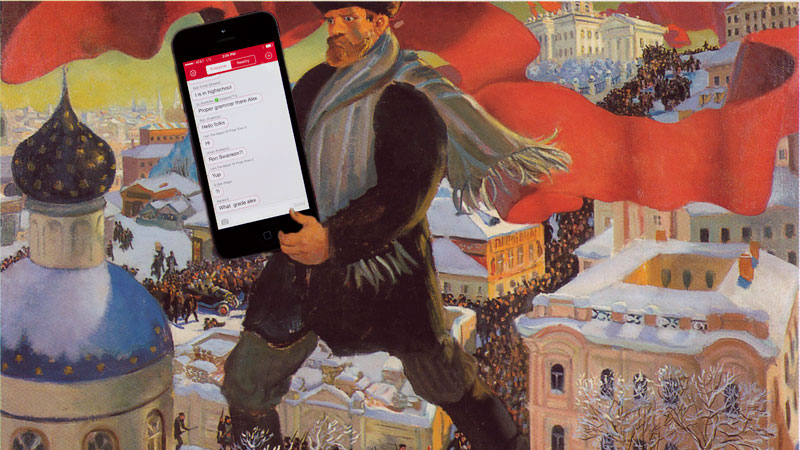Ever wary of “pro-democracy movements,” Russia’s state-controlled mass media have been quick to describe the protests in Hong Kong as an American-orchestrated color revolution. RIA Novosti says former US Deputy Defense Secretary Paul Wolfowitz, “one of the authors of a paper about the Soviet threat,” has had a hand in destabilizing China. Channel One speculates that Washington is trying to punish Beijing for refusing to side against Russia in the Ukraine conflict.
American technology is undoubtedly playing a significant role in Hong Kong’s unrest. Initially, pro-democracy demonstrators used Instagram to publicize their actions and coordinate the protest. As tens of thousands have come out to call for freer elections, concerns about clogged cellphone networks have grown. After China blocked access to Instagram on the mainland, fears spread that Hong Kong officials might deliberately shut down data networks that enable users of mobile devices to connect to messaging services like Instagram, Twitter, and Facebook.
Thousands in Hong Kong have turned to a unique app called FireChat, which can use Bluetooth to allow communication between iOS and Android devices that aren’t even connected to the Internet. FireChat’s offline function only works when users aren’t far from one another, but this is a fairly surmountable obstacle for protesters banding together in public squares to resist police. Despite privacy concerns, the app already made a splash in Iran and Iraq, earlier this year.

Stanislav Shalunov, CTO and co-founder of Open Garden, FireChat's parent company. Opengarden.com.
Like other online services, Open Garden, FireChat’s parent company, is based in San Francisco. From the Russian perspective, one thing about Open Garden that sets it apart from competitors is that its co-founder and chief technology officer is Stanislav Shalunov, a Moscow native and graduate of Moscow State University’s Mechanics and Mathematics department. Shalunov, now an American citizen, told RuNet Echo that FireChat “is not Russian technology,” though he still values the education he received in Moscow in the 1990s.
Shalunov’s Moscow roots haven’t passed unnoticed in the Russia media, where some outlets have reported how “a messenger by a Moscow State mechanics and math graduate has become a protest instrument in Hong Kong.” Given the popular frame in Russia that the United States is masterminding Hong Kong’s pro-democracy demonstrations, FireChat’s Russian tie-in is awkward for the pro-Kremlin press: where Instagram failed, the invention of a Moscow-born mathematician is aiding China’s most dramatic civic unrest since Tiananmen Square.
In a phone call with RuNet Echo, Shalunov said FireChat is foremost “a tool for communication, not revolution.” He is perfectly aware, however, that the app’s ability to overcome data network congestion (or the absence of a data connection altogether) makes it a powerful tool in the hands of protesters. In a mix of manifesto and self-promotion, he tweeted earlier yesterday:
The tools of the revolution are glasses, respirator, and #FireChat.
— Stanislav Shalunov (@shalunov) September 30, 2014
Because FireChat involves the “exchange of information between users of the Internet,” the service will theoretically be subject to Russia’s new data localization regulations, which require such online services to store all user data on servers inside the Russian Federation. Shalunov says FireChat’s user data is currently housed on servers in the United States, though the contents and even the meta data of all exchanges aren't saved. Regardless, “FireChat will never store data in Russia,” Shalunov answered, when asked what the service would do, if the Russian government approaches Open Garden about complying with the new data localization law.
In comments to the Russian website Snob.ru, Shalunov explains that any form of mass censorship relies on the complacency of the public. “The degree of isolation in Russia today is completely voluntary,” he says. “And it’s much higher than could be achieved on a purely technical level.” Shalunov likens Russian Internet users to their counterparts in China, where homegrown alternatives to Google and Facebook are also more popular. “Russian users want everything to be Russian, Chinese users want everything to be Chinese,” he says with some disapproval, “and in all other countries, people prefer to choose the best.”





4 comments